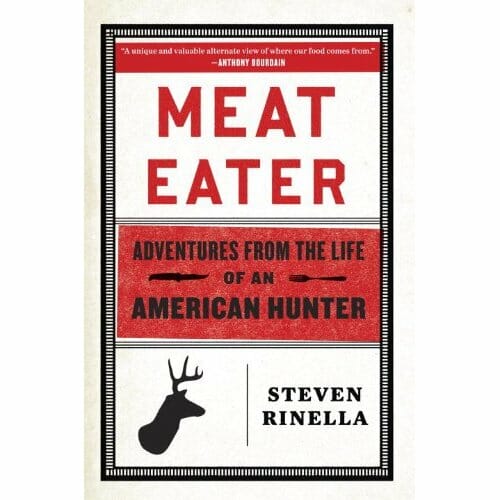Meat Eater: Adventures from the Life of an American Hunter by Steven Rinella
Squirrel Stew and the Persistent Pleasures of Hunting

When Michael Pollan first issued his seven-word eating mantra—”Eat food. Not too much. Mostly plants.”—it must have sounded strange to those reared in a world of only iceberg and romaine lettuce.
Indeed, I must confess it took moving to California for me to discover the varying tastes and textures of collard greens, kale and mustard greens. But turn to the world of meat, and you still find limited choices for wedding-reception menus: beef, chicken or fish. The only real variation in meat depends on cut.
Or does it?
Enter the kitchen of Brooklyn-based hunter Steven Rinella, and one can suddenly choose from squirrel, beaver, venison, black bear, bonefish, sheep or numerous kinds of fowl, depending on what he has in the freezer chest in one closet.
Whether or not readers of Rinella’s new book, Meat Eater, will ever try cooking such meats, he nevertheless intersperses the 11 rambling hunting tales that comprise his book with tasting notes: the way to butcher deer so it doesn’t taste too gamey, the patient cooking of beaver tail that renders it the favored treat of hunters past, the canned soup best for stewing squirrel meat in a crockpot.
Not that Rinella wrote a cookbook, mind you. On one level, he’s penned an entertaining collection of the sort of anecdotes that, if you had the good luck to meet him at a Brooklyn hipster’s cocktail party, would be conversational gold. Though animals figure almost as prominently in his narrative as people, Rinella is an astute observer, with an eye for delightfully telling details.
Of a fishing trip to Mexico, he writes, “European backpackers with dark tans and tribal tattoos tried to sell handmade jewelry and joints to European backpackers who were less tanned and less tattooed.” Describing an eccentric friend of his father’s, he says Groters “… was an enthusiastic fixer of broken mechanical contraptions and he liked to invent mechanical contraptions that would soon break.”
But in Meat Eater, Rinella does more than tell stories well and share exotic cooking tips. He writes from the standpoint of a married writer and father living in one of the world’s more densely populated metropolises. His book sets up an implicit contrast between city and wilderness, semi-settled midlife and a more footloose young manhood. The stories also touch on some of the same fundamental changes in the nature of living and working in America that Matthew B. Crawford described in his 2009 book, Shop Class as Soulcraft: An Inquiry Into the Value of Work.
Though many men and some women probably share something of the childhood introduction to hunting that Rinella describes so vividly—a youth in which he and his two brothers raise pet raccoons, trap muskrats on nearby ponds and learn to build deer stands—something drives this writer to stake his very bodily existence on these burgeoning skills. Not once but multiple times in the book, Rinella’s ability to catch, clean, butcher and cook an animal decides the difference between hunger and eating, starving and feasting. These stories make clear that successfully completing and carting home a hunt requires varied skills that far exceed Boy Scout basics.
Rinella typically makes hunting and fishing expeditions multi-day camping trips to rugged country. The long hikes and sometimes treacherous pursuit of animals require substantial physical stamina and agility, along with the strength to pack out heavy bags laden with gear and meat. The author also possesses a detailed knowledge of terrain and an eye for the sometimes-subtle clues indicating the presence of animals … clues that also indicate the type of animal and how recently it passed.
Once Rinella gets close to his prey, success may require skillfully operating a bow and arrow, various kinds of firepower, or an array of fishing lures, hooks and lines. After waiting hours with great patience, often in conditions of physical discomfort, he must act swiftly, accurately and astutely in aiming for the animal.
-

-

-

-

-

-

-

-

-

-

-

-

-

-

-

-

-

-

-

-

-

-

-

-

-

-

-

-

-

-

-

-

-

-

-

-

-

-

-

-








































